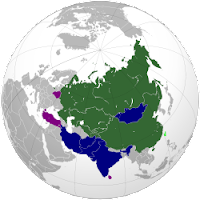There
exists one of the most remarkably lucid and intelligent,
non-hyperbolic and sobering analyses of the financial meltdown that
began in 2007 and continues to affect a significant proportion of the
working population in many countries—the US being no exception.
 |
| Richard Duncan |
Richard
Duncan, the author of the book, The New Depression: The
Breakdown of the Paper Money Economy, is
no left-wing, long-haired, Commie pinko navel gazer. Uh-uh, he's on
the management team of a straight shooting, upright (probably Chamber
of Commerce card-carrying) investment firm out of Singapore (Lee Kwan
Yew's Asian Tiger) that goes by the name of Blackhorse
Asset Management.
A short
list of the kudos that make you sit up and take notice of what he
says:
worked
in the investment industry for more than 20 years
spent two years at the
World Bank in Washington, D. C
author
of the bestselling book The Dollar Crisis: Causes,
Consequences
1993, one of the first
to warn of the impending collapse of the Thai economy
consultant for the
International Monetary Fund
Duncan, contrary to what you
might expect from an investment consultant, is an advocate of
government spending. He compares the present “New Depression”
with elements of the Great Depression of the 1930s. [See table
below.] Both are the result of the bursting of credit/debt bubbles
wherein the normal flow of credit freezes up and debts can no longer
be paid. In the 1930s “the banking system … and global trade
collapsed ... the US economy shrank by 46% … and unemployment
ranged from 15 to 25% for a decade.”*
The Great
Depression & The New Depression
1.
Gold Standard Breaks Down (1914) = Bretton Woods Breaks Down
(1971)
2. Credit Boom: The Roaring Twenties = Credit Boom: Global
Economic Bubble
3. Boom Leads to Bust When The Credit Can’t Be
Repaid (1930 and 2008)
4. Banking Collapse (1930 and 2008)
5.
International Trade Collapses (1930 and 2008)
Franklin D. Roosevelt's “New
Deal” helped to alleviate some of the worst effects of high
unemployment with government programs in infrastructure spending such
as building dams and creating national parks. But, in fact, it was
World War II that really ended the depression with massive government
spending. “At that time government spending ... increased 900
percent; not 9 percent, not 90 percent. 900 percent.”* Duncan
ironically notes that WWII not only ended the depression but also
ended 60,000,000 lives. He calls this his “disaster scenario” but
is not calling a repeat, necessarily.
To conclude this post with
what some might find to be a shocking notion, Duncan believes that we
no longer live under the sacred cow of Capitalism as an economic
system, but something he calls “Creditism”. With the collapse of
the credit bubble, Duncan says that credit can no longer expand, the
private sector can't take on any more debt because of the nature of
the economic cycle of supply and demand (fewer jobs, less money, less
demand, less need for supply, reduced economic activity and higher
unemployment). Only the government can take on more debt. “So this
means we're dependent on government spending whether we like it or
not.”* Duncan is not enamored of this situation, but he shrugs his
shoulders.
Under the “dynamic” of
Capitalism businesses would invest, profit, accumulate capital,
invest, profit, accumulate capital, invest, profit.....ad
infinitum The system no longer works this way, says, Duncan. In
the new dynamic of “Creditism” the system is “driven by credit
(he equates credit with debt) creation, consumption, [debt] credit
creation, consumption, [more debt] credit creation, consumption
....”*
The global economy is on
life support, says Duncan, and governments are the ICU—like it or
not.
Looks like the governments
of the world will just have to keep throwing money at it. That's OK
for another five, maybe 10 years, says Duncan, but beyond that, if we
keep throwing a few billions at Wall Street to encourage consumption
every time the Dow tanks, we are going to find ourselves Greece
revisited. Neither do we want WWIII. Duncan advocates government
spending as investment in renewable energy technology,
infrastructure, investment that, theoretically at least, would both
create work and lay the foundation for future expansion. [Currently,
13% of the US's energy comes from renewables including dams. Solar is
still <1%. The rest is from coal 42%, natural gas 25%, nuclear 19%
and petroleum <1%.]
Looks like the Tea Party
types, austerity advocates and those pitching
only-private-enterprise-can-“create jobs” are living in a world
that went out with Lehman Brothers in 2008.
Riddle: What happened when
Marie Antoinette went out with Versailles! They conceived “la
Guillotine”!
 Accordingly,
then, I'm entering detox and rehab tomorrow. Or, put another
way, I'm taking a few weeks for summer travel sans computer,
smart phone, iPad or other Internet access toys—unless some Good
Samaritan lets me use theirs.
Accordingly,
then, I'm entering detox and rehab tomorrow. Or, put another
way, I'm taking a few weeks for summer travel sans computer,
smart phone, iPad or other Internet access toys—unless some Good
Samaritan lets me use theirs.

















